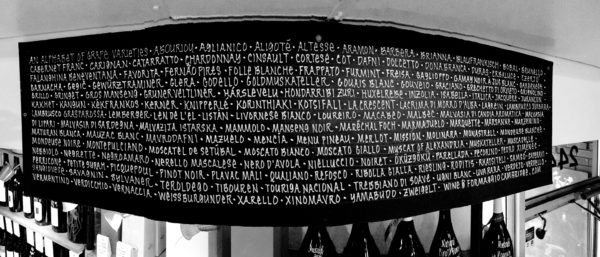
The chalkboard that hung over the old wine corner shelves at 244 Huron Avenue prior to the move to our new location listed a hundred or so lesser-known grapes from which wine is made today. It stood as a tediously hand-lettered warning to those who believe a passing familiarity with Chardonnay, Sauvignon Blanc, Pinot Noir and Merlot punches their ticket into the Fellowship of Wine Know-Somethings.
But even if you were on intimate terms with every cultivar whose name was memorialized there, you would still be far short of a comprehensive knowledge of wine grape varieties. The most authoritative English language ampelographical resource in print identifies no less than 1,380 as currently in use somewhere in the world. One might well ask: Why so many?
It’s simple, really. Each new vine which is produced the old-fashoned way — from seed — carries some of the DNA of its parents, including the DNA of its parent’s parents and its parent’s parents parents, and thus resembles, but is never a perfect copy of its immediate antecedent. Under these circumstances, you can’t dream of seeing all desirable parental qualities faithfully reproduced in each offspring. It does, however, ensure a wild proliferation of possible genotypes.
As you may have guessed, the operative phrase here is ‘produced from seed.’ Wine-growers have known since ancient times that the only sure way to preserve and pass on the good qualities of a healthy, productive, long-lived vine is by means of asexual reproduction.
To accomplish this, it’s necessary to forego propagation from seed and instead create a new vine by grafting a cutting from the parent vine onto an existing root or trunk, or, alternatively, resort to an ancient trick still in favor among many naturalist winemakers: pull a fruiting cane down to the ground and bury a section of it containing a bud, where it will root. Once established, you merely cut the connection to the parent plant and you’ve got a vine baby that’s a perfect genetic copy of its parent. No botanical canoodling whatever involved.
Today, plant scientists have various ways of creating new vine varieties that emphasize desirable qualities and suppress less welcome ones. Once a useful new vine is created, the standard method for making sure it doesn’t move around on you genetically is to closely supervise its clonal propagation in plant nurseries.
What this means to you, budding Know-Something, is that once you’ve painstakingly learned all 1,380 grape varieties and their idiosyncrasies, you can start sorting out the various clonal sub-varietals of each. Chardonnay and Pinot Noir alone have scores of them.
To keep track of them all, you’ll surely need more of this.
-Stephen Meuse
* No Sex Please, We’re British, a British farce written by Alistair Foot and Anthony Marriott, opened in London on 3 June 1971. Disparaged by critics, it nonetheless ran for 16 years — a total of 6,761 performances.